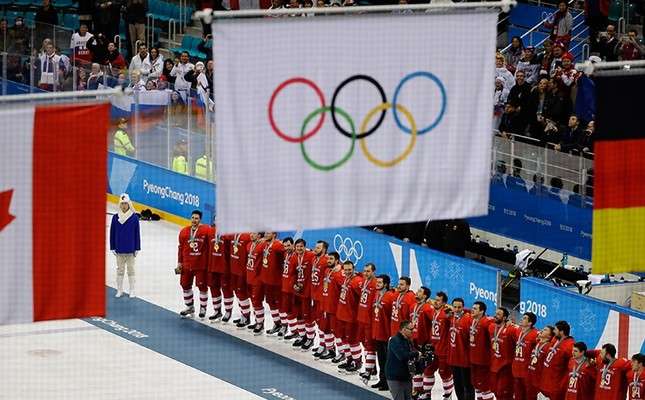Kirill Kaprizov scored the game-winner as "Team Olympic Athlete From Russia" came back to beat underdog Germany 4-3 in overtime to put a thrilling end to a men's tournament lacking buzz not only in South Korea but back in North America, where the NHL season went on during the games for the first time since 1994.
Russian flags — the team barred from using them by International Olympic Committee (IOC) sanctions for state-sponsored doping — hung behind the bench as the team celebrated and screamed with job. More than 200 fans that cheered for the team all tournament sang the Russian anthem, too, but the players did them one better and bellowed the anthem over the top of the Olympic anthem as the Olympic flag rose to the rafters.
Defenseman Bogdan Kiselevich said players sang the Russian anthem as an expression of "freedom of speech."
"You play for your country, it is more important," added Russian captain Pavel Datsyuk, who won his first gold medal at his third Olympics. "It feels good, but I have accomplished my dream. Now I have no dream."
Hours earlier the IOC voted unanimously to keep the country's ban for mass doping, which means that Russian athletes will not be able to march behind their flag at the Olympics closing ceremony later Sunday.
But the IOC said the suspension would be lifted — an IOC source said in "a few days or a few weeks" — if no further positive drug tests come out of the Games, where two Russians tested positive for doping.
They were representing "Olympic Athletes from Russia" under strict guidelines including a ban on Russia's flag, national colors and the national anthem.
The vote to keep the ban for the time being followed a recommendation from the IOC's executive board, which met Saturday and early Sunday to thrash out Russia's fate.
It was the first Russian gold medal in hockey since 1992 in Albertville when the team also played under a neutral flag as the Community of Independent States. Constantly saying it doesn't matter that they had to wear nondescript red and white uniforms that lacked the Russian Coat of Arms, players gave the Russians their second gold and 17th total medal of the Olympics.
This one was expected all along.
Stocked with former NHL players — Pavel Datsyuk, Ilya Kovalchuk, Slava Voynov, Mikhail Grigorenko and Nikita Nesterov — the Russians were by far the most talented team in the tournament. U.S. coach Tony Granato said they may be as good as 20 of the 31 NHL teams.
The skill primarily from the Kontinental Hockey League was on full display — and the Russians needed it against disciplined, opportunistic Germany, which had all of its players from leagues in its homeland.
Voynov, at the Olympics because he was banned from the NHL in 2015 for his domestic abuse conviction, cashed in a turnover by Germany's Yasin Ehliz in the final moments of the first period to open the scoring. Voynov's shot from just inside the blue line got past aus den Birken and in with just 0.5 seconds on the clock.
It did anything but deflate Germany. Vasily Koshechkin let in a fluke goal to Felix Schultz and the game was tied 1-1 going to a wild third period. Russia's Nikita Gusev scored when his shot bounced in off the helmet of goaltender Danny aus den Birken, but Dominik Kahun answered 10 seconds later. And when Jonas Muller slid the puck past Koshechkin with 3:16 left and then Russia took a high-sticking penalty, it looked like a major upset was on tap.
Instead, with Koshechkin pulled for the extra attacker to make it 5-on-5, Gusev scored again to help send the game to overtime.
There, aus den Birken needed to make an edge-of-his-pad save on Kovalchuk all alone driving to the net to keep the game going. A high-sticking penalty on Germany's Patrick Reimer 9:11 into overtime put the Russians on the power play, where Kaprizov scored the winner and one of the biggest goals in Russian hockey history.
Reimer sat dejected in the penalty box for long moments as the Russians celebrated on the ice in front of him.
Still, Germany's run to its first gold-medal game won't soon be forgotten.
"It's probably going to take a few hours to realize what we've done here," forward Gerrit Fauser said.
More about: Winter-Olympics Russia
















































